汉译英翻译技巧..
英译汉技巧和方法
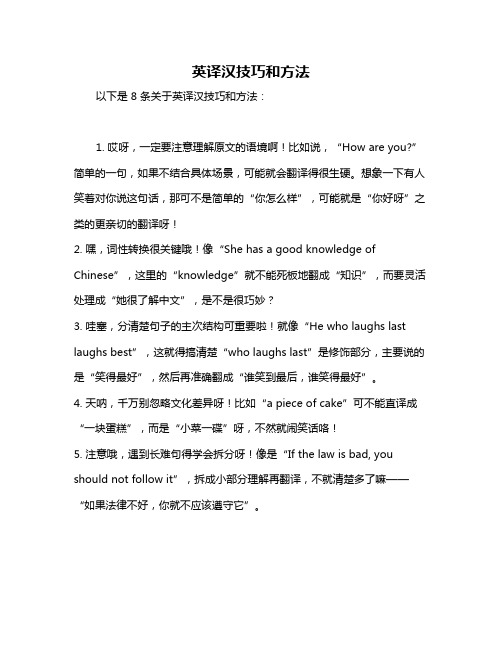
英译汉技巧和方法以下是 8 条关于英译汉技巧和方法:1. 哎呀,一定要注意理解原文的语境啊!比如说,“How are you?” 简单的一句,如果不结合具体场景,可能就会翻译得很生硬。
想象一下有人笑着对你说这句话,那可不是简单的“你怎么样”,可能就是“你好呀”之类的更亲切的翻译呀!2. 嘿,词性转换很关键哦!像“She has a good knowledge of Chinese”,这里的“knowledge”就不能死板地翻成“知识”,而要灵活处理成“她很了解中文”,是不是很巧妙?3. 哇塞,分清楚句子的主次结构可重要啦!就像“He who laughs last laughs best”,这就得搞清楚“who laughs last”是修饰部分,主要说的是“笑得最好”,然后再准确翻成“谁笑到最后,谁笑得最好”。
4. 天呐,千万别忽略文化差异呀!比如“a piece of cake”可不能直译成“一块蛋糕”,而是“小菜一碟”呀,不然就闹笑话咯!5. 注意哦,遇到长难句得学会拆分呀!像是“If the law is bad, you should not follow it”,拆成小部分理解再翻译,不就清楚多了嘛——“如果法律不好,你就不应该遵守它”。
6. 哎呀呀,适当增减词会让翻译更通顺呢!比如“He gave me a book”翻成“他给了我一本书”,要是原文强调只给了一本,那就可以加上“仅仅”之类的词更准确。
7. 哈哈,反复琢磨很有必要呀!像“Love me, love my dog”要是不仔细想,可能就翻译成“爱我,爱我的狗”,这就不对啦,应该是“爱屋及乌”呀!8. 记住哟,选取合适的汉语词汇来对应英语很有讲究哒!比如说“black tea”总不能翻成“黑茶”,而是“红茶”呀!总之,英译汉靠的就是这些小技巧和方法,多练多总结准没错!。
汉英翻译技巧

汉英翻译技巧汉英翻译技巧前言汉英翻译是一项具有挑战性的任务,需要准确传达原文的意思,并符合英语语法和表达习惯。
以下是一些常用的汉英翻译技巧,帮助提升翻译质量。
技巧一:理解上下文在进行汉英翻译时,理解上下文是至关重要的。
词语的意思可能因为其所处的句子、段落或篇章而有所不同。
因此,在进行翻译时,要综合上下文的语境进行准确翻译。
技巧二:注意语法结构汉语的语法结构与英语有很大差异,特别是词序和动词时态。
在进行翻译时,要注意调整句子结构和词语顺序,使之符合英语的语法规则。
技巧三:选择合适的词汇在进行汉英翻译时,选择合适的词汇是十分重要的。
不同词汇可能有不同的含义和语义,需根据句子的语境和意思进行选择。
对于具有多个意思的词汇,要根据上下文来选择正确的翻译。
技巧四:避免直译直译是指逐字逐句地翻译,可能导致翻译不准确或不流畅。
在进行汉英翻译时,应该以意译为主,即根据语境、文化差异和表达习惯进行适当调整,保证翻译准确且符合英语表达习惯。
技巧五:考虑语言风格汉英翻译的语言风格应符合目标受众的口语或书面语习惯。
在翻译时,要考虑是否需要使用正式或非正式的表达方式,避免产生不必要的歧义或误解。
技巧六:检查和校对汉英翻译完成后,应进行仔细的检查和校对。
检查翻译是否准确、流畅,并排除语法错误和拼写错误。
此外,还要确保翻译是否与原文一致,并保持一致的术语和风格。
以上是一些常用的汉英翻译技巧,希望对提升翻译质量有所帮助。
翻译需要不断的练习和积累经验,在长期的实践中不断提升自己的翻译水平。
技巧七:使用在线资源和工具在进行汉英翻译时,可以利用各种在线资源和工具来辅助翻译工作。
例如,可以使用在线词典或翻译软件来查询生词或短语的意思。
此外,还可以使用语料库和翻译记忆工具来提高翻译速度和准确性。
技巧八:了解目标读者在进行汉英翻译时,了解目标读者是非常重要的。
不同的受众可能有不同的阅读习惯和背景知识。
要根据目标读者的需求和背景来进行翻译,使之更易于理解和接受。
汉译英翻译的技巧
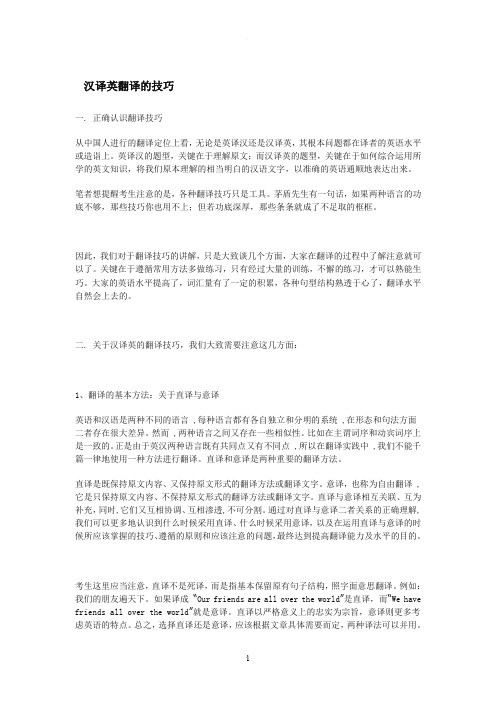
汉译英翻译的技巧一. 正确认识翻译技巧从中国人进行的翻译定位上看,无论是英译汉还是汉译英,其根本问题都在译者的英语水平或造诣上。
英译汉的题型,关键在于理解原文;而汉译英的题型,关键在于如何综合运用所学的英文知识,将我们原本理解的相当明白的汉语文字,以准确的英语通顺地表达出来。
笔者想提醒考生注意的是,各种翻译技巧只是工具。
茅盾先生有一句话,如果两种语言的功底不够,那些技巧你也用不上;但若功底深厚,那些条条就成了不足取的框框。
因此,我们对于翻译技巧的讲解,只是大致谈几个方面,大家在翻译的过程中了解注意就可以了。
关键在于遵循常用方法多做练习,只有经过大量的训练,不懈的练习,才可以熟能生巧。
大家的英语水平提高了,词汇量有了一定的积累,各种句型结构熟透于心了,翻译水平自然会上去的。
二. 关于汉译英的翻译技巧,我们大致需要注意这几方面:1、翻译的基本方法:关于直译与意译英语和汉语是两种不同的语言 ,每种语言都有各自独立和分明的系统 ,在形态和句法方面二者存在很大差异。
然而 ,两种语言之间又存在一些相似性。
比如在主谓词序和动宾词序上是一致的。
正是由于英汉两种语言既有共同点又有不同点 ,所以在翻译实践中 ,我们不能千篇一律地使用一种方法进行翻译。
直译和意译是两种重要的翻译方法。
直译是既保持原文内容、又保持原文形式的翻译方法或翻译文字。
意译,也称为自由翻译 ,它是只保持原文内容、不保持原文形式的翻译方法或翻译文字。
直译与意译相互关联、互为补充,同时,它们又互相协调、互相渗透,不可分割。
通过对直译与意译二者关系的正确理解,我们可以更多地认识到什么时候采用直译、什么时候采用意译,以及在运用直译与意译的时候所应该掌握的技巧、遵循的原则和应该注意的问题,最终达到提高翻译能力及水平的目的。
考生这里应当注意,直译不是死译,而是指基本保留原有句子结构,照字面意思翻译。
例如:我们的朋友遍天下。
如果译成“Our friends are all over the world”是直译,而“We have friends all over the world”就是意译。
_汉译英翻译常用技巧
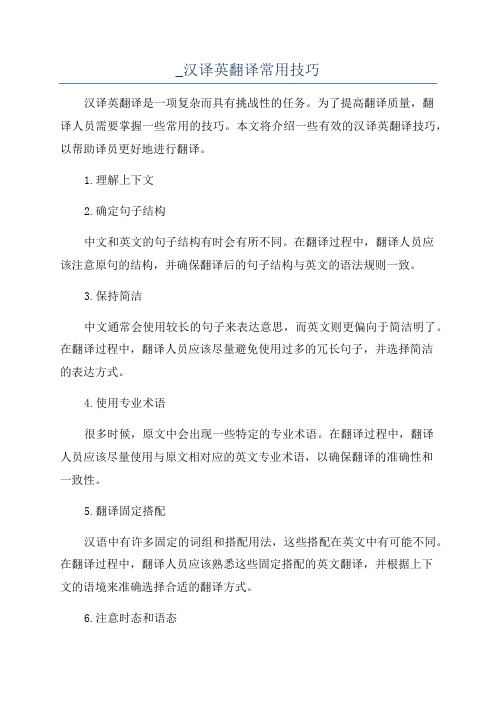
_汉译英翻译常用技巧汉译英翻译是一项复杂而具有挑战性的任务。
为了提高翻译质量,翻译人员需要掌握一些常用的技巧。
本文将介绍一些有效的汉译英翻译技巧,以帮助译员更好地进行翻译。
1.理解上下文2.确定句子结构中文和英文的句子结构有时会有所不同。
在翻译过程中,翻译人员应该注意原句的结构,并确保翻译后的句子结构与英文的语法规则一致。
3.保持简洁中文通常会使用较长的句子来表达意思,而英文则更偏向于简洁明了。
在翻译过程中,翻译人员应该尽量避免使用过多的冗长句子,并选择简洁的表达方式。
4.使用专业术语很多时候,原文中会出现一些特定的专业术语。
在翻译过程中,翻译人员应该尽量使用与原文相对应的英文专业术语,以确保翻译的准确性和一致性。
5.翻译固定搭配汉语中有许多固定的词组和搭配用法,这些搭配在英文中有可能不同。
在翻译过程中,翻译人员应该熟悉这些固定搭配的英文翻译,并根据上下文的语境来准确选择合适的翻译方式。
6.注意时态和语态中文和英文的时态和语态使用规则有所不同。
在翻译过程中,翻译人员应该根据原文的语境和动词的时态来选择合适的英文表达方式。
7.注意代词的使用中文中的代词使用频率较高,而英文中的代词使用较少。
在翻译过程中,翻译人员应该根据上下文的语境来确定是否需要使用代词,并选择合适的英文代词。
8.注意修饰语的位置中文中的修饰语通常紧跟在名词之后,而英文中的修饰语通常放在名词之前。
在翻译过程中,翻译人员应该注意修饰语的位置,并正确翻译。
9.注意词汇和词义的转换在翻译过程中,翻译人员应该根据上下文的语境,准确地选择合适的英文词汇和词义,并将其转换成英文表达方式。
10.注意语气的表达中文和英文的语气表达方式有所不同。
在翻译过程中,翻译人员应该注意原文中的语气,并选择合适的英文表达方式,以保持原文的语气和风格。
总之,汉译英翻译是一项需要技巧和经验的任务。
翻译人员应该不断学习和提升自己的翻译技巧,以保证翻译的准确性和流畅性。
汉译英翻译十大技巧
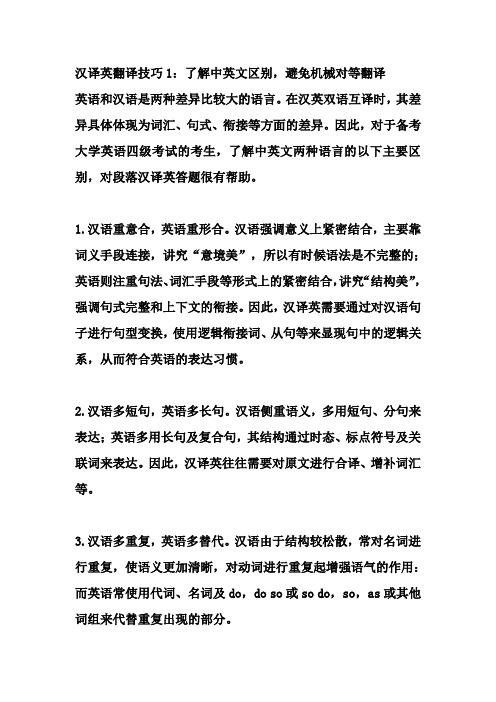
译文: A good chef is always trying to seek balance among cereal, meat and vegetable.
解析:仔细分析发现,句中有两个动词,分别是“努力”和“取得”,而“取得”是“努力”的目的,故把“努力”处理为谓语动词,“取得…”作目的状语。整句的主干为“厨师努力去取得”,译作…chef is trying to seek
2.汉语多短句,英语多长句。汉语侧重语义,多用短句、分句来表达;英语多用长句及复合句,其结构通过时态、标点符号及关联词来表达。因此,汉译英往往需要对原文进行合译、增补词汇等。
3.汉语多重复,英语多替代。汉语由于结构较松散,常对名词进行重复,使语义更加清晰,对动词进行重复起增强语气的作用:而英语常使用代词、名词及do,do so或so do,so,as或其他词组来代替重复出现的部分。
3.用解释的方式。中文的习惯用语和四字成语是令大家头痛的难点,汉译英时,可分两步走:先用浅显易懂的中文对其进行解释,然后再将其转化为英文。
4.根据上下文中的某个表达翻译某些难译的词。四级考试所考查的段落翻译是就某个话题展开的,所以有时可以借用上下文一些相关的表达来译出一些难以直译的词。
【例9】他为人太过圆滑,所以没人喜欢他
【例11】历史上,小说作为一种文学形式经常被忽视和否定。尽管如此,对社会发展来说,小说起着不可磨灭的作用。
In history, novel, as a form of literature,
was often ignored and denied. In spite of these,to the development of society, novel has an
英汉翻译的八大技巧
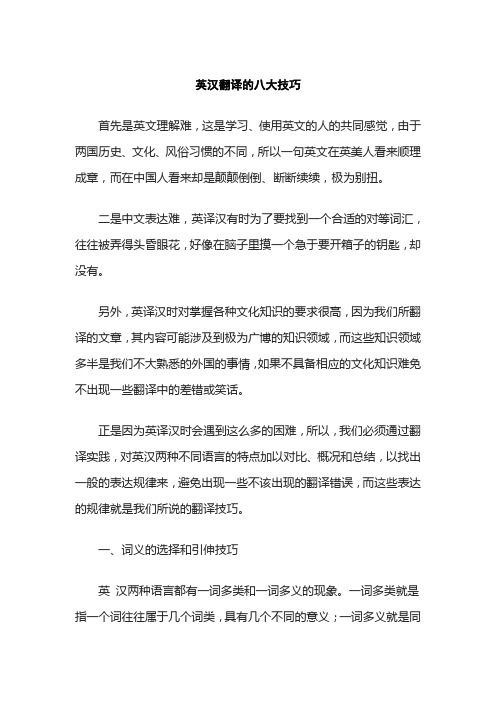
英汉翻译的八大技巧首先是英文理解难,这是学习、使用英文的人的共同感觉,由于两国历史、文化、风俗习惯的不同,所以一句英文在英美人看来顺理成章,而在中国人看来却是颠颠倒倒、断断续续,极为别扭。
二是中文表达难,英译汉有时为了要找到一个合适的对等词汇,往往被弄得头昏眼花,好像在脑子里摸一个急于要开箱子的钥匙,却没有。
另外,英译汉时对掌握各种文化知识的要求很高,因为我们所翻译的文章,其内容可能涉及到极为广博的知识领域,而这些知识领域多半是我们不大熟悉的外国的事情,如果不具备相应的文化知识难免不出现一些翻译中的差错或笑话。
正是因为英译汉时会遇到这么多的困难,所以,我们必须通过翻译实践,对英汉两种不同语言的特点加以对比、概况和总结,以找出一般的表达规律来,避免出现一些不该出现的翻译错误,而这些表达的规律就是我们所说的翻译技巧。
一、词义的选择和引伸技巧英汉两种语言都有一词多类和一词多义的现象。
一词多类就是指一个词往往属于几个词类,具有几个不同的意义;一词多义就是同一个词在同一词类中又往往有几个不同的词义。
在英译汉的过程中,我们在弄清原句结构后,就要善于运用选择和确定原句中关键词词义的技巧,以使所译语句自然流畅,完全符合汉语习惯的说法;选择确定词义通常可以从两方面着手:1、根据词在句中的词类来选择和确定词义They are as like as two peas .他们相似极了。
(形容词)He likes mathematics more than physics .他喜欢数学甚于喜欢物理。
(动词)Wheat, oat, and the like are cereals .小麦、燕麦等等皆系谷类。
(名词)2、根据上下文联系以及词在句中的搭配关系来选择和确定词义。
He is the last man to come .他是最后来的。
He is the last person for such a job .他最不配干这个工作。
英汉互译八种技巧

注意事项
保持原文的语义和语法正确
在直译过程中,要确保译文准确地传达了原文的语义和语法,避 免出现歧义或误解。
尊重原文的文化特色
直译法要尊重原文的文化特色,尽可能保留原文的文化信息,避免 因文化差异而引起的误解。
符合目标语言的表达习惯
尽管直译法强调保持原文的形式,但译文仍需符合目标语言的表达 习惯,以使读者能够更好地理解和接受。
注意事项
准确理解原文
在运用直译与意译结合法时,首 先要准确理解原文的意思,避免
因理解错误而导致翻译错误。
灵活调整词序
在直译与意译结合的过程中,需 要根据汉语的表达习惯灵活调整 英文原句的词序,使译文更加自
然流畅。
保持原文风格
在翻译过程中,要尽量保持原文 的风格和语言特色,如比喻、修 辞等,以使译文更加贴近原文。
注意事项
加注应当符合目标语言的表达习惯和规范,避免出现 语法错误或表达不当的情况。
加注应当简洁明了,避免过多的解释和说明,以免影 响读者的阅读体验。
加注应当尽可能地保留原文的信息和意义,避免出现 信息丢失或误解的情况。
THANKS FOR WATCHING
感谢您的观看
文的含义。
符合目标语言习惯
意译法要求译文符合目标语言的表 达习惯和语法规则,避免出现生硬 或不符合规范的语言表达。
保持原意不变
意译法的核心是保持原文意思不变, 因此在翻译过程中要特别注意保持 原意的完整性和准确性,避免出现 信息的遗漏或误解。
04
音意结合法
定义
• 音意结合法是指在进行英汉互译 时,将英文的发音和汉语的意义 结合起来,以达到准确传达原文 意思的目的。
和文化背景。
适用范围
当源语言与目标语言存在较大 的文化差异和语言结构差异时, 归化法可以发挥很好的作用。
中译英翻译技巧

一、戒“从一而终”汉语言简意赅,句子灵活,往往是一个汉语词汇对应N 个英语词汇,具体到在本句中应该采用哪个意项,应该采用哪个意项,务必抓住精神实质,务必抓住精神实质,务必抓住精神实质,不可以不变应万变。
不可以不变应万变。
不可以不变应万变。
至于怎么应变,这就是显至于怎么应变,这就是显示译者功力的地方了。
比如:都是“问题”,下面的翻译各不相同,几乎是打一枪换一个地方。
共同关心的问题questions of common interest解决问题solve a problem问题的关键the heart of the matter关键问题 a key problem原则问题 a question/matter of principle没有什么问题without any mishap摩托车有点问题Something is wrong with the motorcycle.问题不在这里That is not the point.译者要掌握这种汉英翻译中的“游击战术”,翻译家应是不同“文化王国”边境线上的“游击战略家”。
沙博里将《水浒传》译为:Outlaws of the Marsh(沼泽地上的亡命之徒沼泽地上的亡命之徒),杨宪益译将屈原的《国殇》译为:For Those Fallen forTheir Country ,北外出版社将《儒林外史》译为:The Scholars 。
这些都是译者吃透了原文的原意而译出的佳作。
二、戒望文生义,机械直译这多半是初学者犯的毛病,他们易于被表面现象所迷惑。
黄牛(yellow cow ————ox ox 前误后正,下同) 黄鹂bird (yellow bird ——————oriole) oriole)黄瓜( yellow melon ————cucumber) cucumber) 紫菜vegetable (purple vegetable ——————laver) laver)红木(red wood ————padauk) padauk) 红豆杉(red fir ————Chinese Chinese yew)黑社会(black society ————sinister sinister gang)三、戒“水土不符”,习惯搭配失当这的确是难度系数较大的问题,它要求译者既有较高的中文修养,又要有较高的英文造。
英译汉的方法和技巧
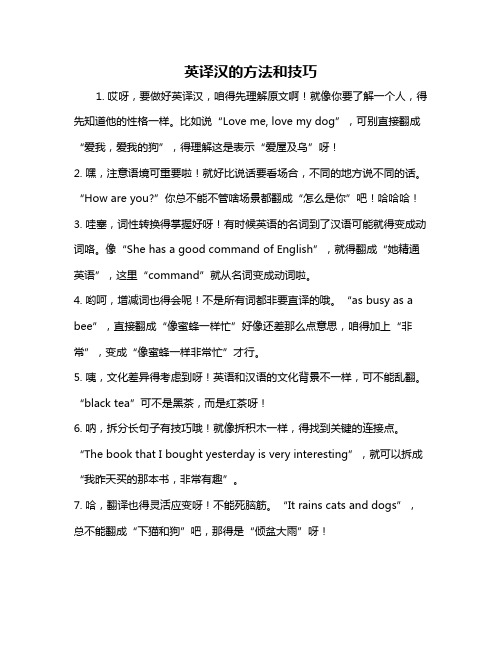
英译汉的方法和技巧
1. 哎呀,要做好英译汉,咱得先理解原文啊!就像你要了解一个人,得先知道他的性格一样。
比如说“Love me, love my dog”,可别直接翻成“爱我,爱我的狗”,得理解这是表示“爱屋及乌”呀!
2. 嘿,注意语境可重要啦!就好比说话要看场合,不同的地方说不同的话。
“How are you?”你总不能不管啥场景都翻成“怎么是你”吧!哈哈哈!
3. 哇塞,词性转换得掌握好呀!有时候英语的名词到了汉语可能就得变成动词咯。
像“She has a good command of English”,就得翻成“她精通英语”,这里“command”就从名词变成动词啦。
4. 哟呵,增减词也得会呢!不是所有词都非要直译的哦。
“as busy as a bee”,直接翻成“像蜜蜂一样忙”好像还差那么点意思,咱得加上“非常”,变成“像蜜蜂一样非常忙”才行。
5. 咦,文化差异得考虑到呀!英语和汉语的文化背景不一样,可不能乱翻。
“black tea”可不是黑茶,而是红茶呀!
6. 呐,拆分长句子有技巧哦!就像拆积木一样,得找到关键的连接点。
“The book that I bought yesterday is very interesting”,就可以拆成“我昨天买的那本书,非常有趣”。
7. 哈,翻译也得灵活应变呀!不能死脑筋。
“It rains cats and dogs”,总不能翻成“下猫和狗”吧,那得是“倾盆大雨”呀!
8. 嘿,多积累多练习可不能忘呀!只有这样才能越来越厉害。
就像学骑自行车,多骑骑就会啦!
我觉得呀,英译汉的方法和技巧都掌握了,那翻译起来就能又快又好啦!。
英译汉翻译技巧必看PPT课件
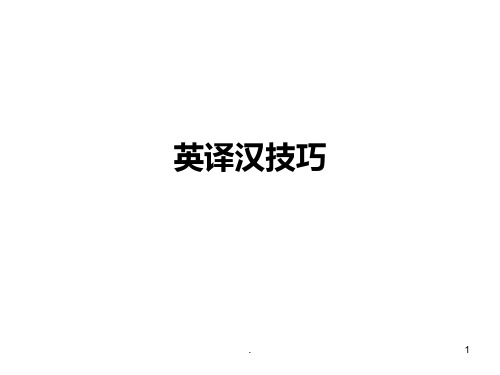
• Strange enough they were the same age to the day.
• 说来也巧, 他俩年纪一样大, 而且还是同 日的。
.
15
5.合译法
• 合译是将原文的两个或几个分开叙述的意 思或层次合并重组,如将两个分句合译为 一个简单句,或两个简单句合译成一个复 合句等, 使全句的结构更加紧凑,语气更 加顺通。
• 直译: 好的婚姻不会仅仅发生—它们需要 大量的爱和大量的工作。
• 意译:幸福的婚姻不是凭空发生的---它需 要你为它付出大量的爱和做大量的工作。
• 或:美满的婚姻不会从天上掉下来---你必 须为它付出大量的爱,做大量的工作。
.
5
• 很显然,本句话的意译要比直译更符合汉 语表达习惯。当然,一句话并不限于一种 译法,要根据具体需要而定。一般来说, 在英汉翻译考试中,如果直译能达意就用 直译,如果直译效果不好,就应该考虑意 译。只要译文内容忠实,意思明白就行了。
• The electronic computer is chiefly characterized by its accurate and rapid computation.
• 计算机的主要特点是计算准确迅速。
.
21
3.英语名词→汉语形容词
• 英语原文中有形容词加后缀构成的名词, 翻译时可转化为汉语的形容词。 如:
• He came to my home for help. • 他来到我家请求帮助。 • I love having Friday off. • 我喜欢周五休息。 • I am for the former. • I am against the latter.
汉译英翻译常用技巧

汉译英翻译常用技巧汉译英是语言转换的过程,需要结合语言特点和句子结构来进行翻译。
下面是汉译英翻译常用技巧的一些要点:1.注意词语的使用在翻译过程中,应注意选择适当的词语,避免使用生硬的直译。
可以根据句子的具体语境来选择合适的词语,充分考虑词义、语体、文化背景等因素。
2.理解词语的多义性汉语中的词语通常有多个义项,需要根据上下文确定正确的翻译。
在翻译过程中,要注意词语的多义性,避免产生歧义。
3.注意语法结构中英语法结构有很大差异,所以在翻译过程中要注意语法结构的转换。
例如,英语中主谓宾的语序与汉语有所不同,需要注意将句子结构调整为符合英语语法的形式。
4.注意动词的时态英语中的动词时态较为复杂,需要根据上下文确定正确的时态。
在翻译过程中,要注意将动词的时态正确地转换为英语的对应形式。
5.注意做动词的“的”和“得”在汉语中,“的”和“得”在做动词时的用法相似,但在英语中它们有不同的翻译。
一般情况下,“的”翻译为“的”或“的”;“得”翻译为“to”或“must”。
6.使用适当的连词在汉译英翻译中,使用适当的连词能够使句子更加流畅。
常用的连词有“but”、“and”、“or”等。
根据句子的逻辑关系和语境,选择合适的连词来进行翻译。
7.注意上下文的衔接在翻译过程中,要注意将上下文的信息进行衔接,以确保翻译准确传达原文的意思。
在处理复杂句子时,要注意将上下文中的重要信息和语法结构准确地表达出来。
8.考虑文化差异汉英翻译中需要考虑不同文化背景对表达方式的影响。
在翻译过程中,要注意在尊重原文的同时,将信息准确传达给目标读者。
9.使用合适的术语和行业词汇根据具体领域的需求,要选择合适的术语和行业词汇。
在翻译过程中,要了解所涉及领域的专业术语,确保翻译的准确性和专业性。
10.多加练习翻译是一项技能,需要通过不断的练习来提高。
多进行汉译英的练习,积累翻译经验,提高翻译的准确性和流利度。
总之,汉译英的翻译技巧是一个不断学习和掌握的过程,通过不断的练习和积累,可以提高翻译的准确性和质量。
英译汉翻译技巧

英译汉翻译技巧英译汉是指将英文翻译为中文的过程,这是一项非常有挑战性的任务。
以下是一些英译汉的技巧,可以帮助提高翻译的准确性和流畅度。
1. 理解上下文:在进行翻译之前,首先要仔细阅读原文,理解其中的上下文和语境。
这样可以帮助你更好地理解作者的意图和表达方式,从而更准确地翻译出来。
2. 注意词汇选择:英文和中文之间存在很多词汇差异,因此在翻译时要注意选择正确的词汇。
可以借助词典、在线翻译工具或者查阅相关语料库来寻找合适的词汇,确保翻译的准确性和恰当性。
3. 保持语法结构一致:英文和中文的语法结构有所不同,翻译时要注意保持语法结构的一致性。
特别是在进行长句或复杂句子的翻译时,要确保句子的结构和语法正确,避免造成歧义或困惑。
4. 注重表达方式:中文和英文的表达方式有很大的差异,翻译时要注重表达方式的转换。
可以借助中文的习惯表达方式和惯用语,使翻译更加流畅自然。
5. 注意文化差异:英文和中文所处的文化环境有所不同,翻译时要注意文化差异。
有些词汇、习惯用语或者俚语在不同的文化背景下可能会有不同的含义,需要适当加以调整或解释,以确保翻译的准确性和适用性。
6. 反复校对和修改:在完成翻译之后,要对翻译的内容进行反复校对和修改。
可以逐句对照原文进行校对,检查是否有语法错误、词汇不准确或表达不清的问题。
通过多次修改和校对,可以逐渐提高翻译的质量和准确性。
7. 增强背景知识:翻译工作需要有广泛的背景知识,因此提高背景知识是提高翻译水平的一项重要任务。
可以通过读书、学习相关专业知识、参加翻译培训等方式来增强自己的背景知识,从而更好地理解和翻译英文内容。
总之,英译汉是一项需要技巧和经验的任务,通过不断学习和实践,可以提高翻译的准确性和流畅度。
汉译英技巧

汉译英技巧
1. 理解上下文
在翻译前,仔细阅读并理解原文的上下文和语境,这有助于准确把握原文的含义,避免产生歧义。
2. 注意语序
汉语和英语的语序有所不同,在翻译时要注意调整语序,使译文符合英语的表达习惯。
3. 掌握固定搭配
英语中存在大量的固定搭配和习惯用语,翻译时要熟练掌握这些表达方式,避免生硬的直译。
4. 注意词性转换
由于两种语言的结构差异,有时需要在翻译时改变词性,如将汉语的动词翻译成英语的名词等。
5. 运用同义替换
当遇到难以直译的词语时,可考虑使用同义词或同义短语来替换,以更好地表达原意。
6. 注重语言风格
翻译时要注重保持原文的语言风格,如是否正式、口语化等,使译文与原文风格相符。
7. 查阅工具书
遇到生词或不熟悉的词语时,及时查阅词典、专业术语手册等工具书,以确保翻译的准确性。
8. 反复修改
翻译完成后,要反复审阅和修改,确保译文通顺、准确,没有语病和错误。
英汉互译八种技巧
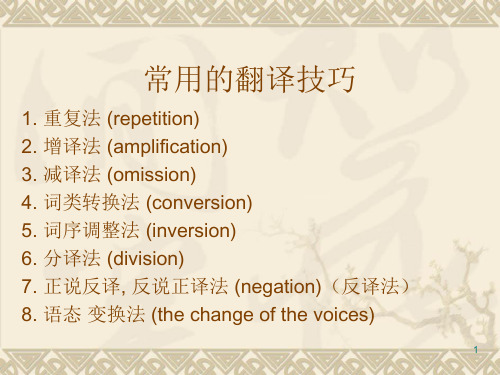
mathematics subtle; natural philosophy deep; moral grave; logic and rhetoric able to contend. ❖ 读史使人明智,读诗使人灵秀,数学使人周密,科 学使人深刻,伦理使人庄重,逻辑修辞之学使人善 辩。
thought and thought it over and over. 他有又上床去,左思右想,想个不停。
8
这种人闹什么东西呢?闹名誉,闹地位,闹出风头。 What are they after? They are after name, after position, and they want to cut smart figure.
of success. ❖ 不要害怕失败。失败是成功之母。 ❖ Translation from Chinese into English is not
so easy as that from English into Chinese. ❖ 汉译英不像英译汉那么容易。 ❖ A large family has its difficulties. ❖ 大(家庭)有大(家庭)的难处。
常用的翻译技巧
1. 重复法 (repetition) 2. 增译法 (amplification) 3. 减译法 (omission) 4. 词类转换法 (conversion) 5. 词序调整法 (inversion) 6. 分译法 (division) 7. 正说反译, 反说正译法 (negation)(反译法) 8. 语态 变换法 (the change of the voices)
英汉译英的方法
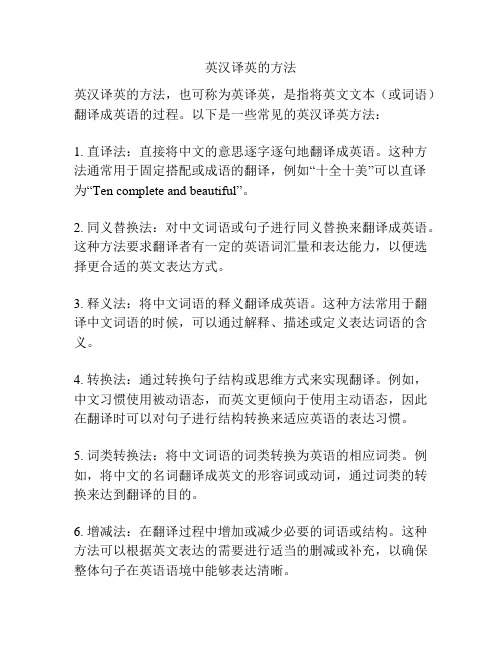
英汉译英的方法
英汉译英的方法,也可称为英译英,是指将英文文本(或词语)翻译成英语的过程。
以下是一些常见的英汉译英方法:
1. 直译法:直接将中文的意思逐字逐句地翻译成英语。
这种方法通常用于固定搭配或成语的翻译,例如“十全十美”可以直译为“Ten complete and beautiful”。
2. 同义替换法:对中文词语或句子进行同义替换来翻译成英语。
这种方法要求翻译者有一定的英语词汇量和表达能力,以便选择更合适的英文表达方式。
3. 释义法:将中文词语的释义翻译成英语。
这种方法常用于翻译中文词语的时候,可以通过解释、描述或定义表达词语的含义。
4. 转换法:通过转换句子结构或思维方式来实现翻译。
例如,中文习惯使用被动语态,而英文更倾向于使用主动语态,因此在翻译时可以对句子进行结构转换来适应英语的表达习惯。
5. 词类转换法:将中文词语的词类转换为英语的相应词类。
例如,将中文的名词翻译成英文的形容词或动词,通过词类的转换来达到翻译的目的。
6. 增减法:在翻译过程中增加或减少必要的词语或结构。
这种方法可以根据英文表达的需要进行适当的删减或补充,以确保整体句子在英语语境中能够表达清晰。
无论使用哪种方法,都要考虑到英文表达的习惯和语法规则,以及实现对原文意思的准确传达。
汉译英的方法和技巧

汉译英的方法和技巧
1.增译法:
指根据英汉两种语言不同的思维方式、语言习惯和表达方式,在翻译时增添一些词、短句或句子,以便更准确地表达出原文所包含的意义。
这种方式多半用在汉译英里。
2.省译法:
这是与增译法相对应的一种翻译方法,即删去不符合目标语思维习惯、语言习惯和表达方式的词,以避免译文累赘。
增译法的例句反之即可。
3.转换法:
由于英汉两种语言在语法和表达方式等方面存在着许多差异,因此英译汉时常常有必要改变表达方式,使译文通顺流畅、地道可读。
这种变通技巧就是转换法(shift of perspective)。
4.合并法:
由于文化上的差异,英译汉时有时直译原文就会使译入语读者感到费解,甚至误解。
这时,就有必要借用汉语中意义相同或相近、且具有自己鲜明文化色彩的表达法对原文加以归化。
归化翻译法常用于处理某些英语成语、典故、形象词语等一类文化色彩较浓的表达方式。
恰
倒好处地归化可以使译文地道简洁、生动活泼,便于译入语读者理解和接受。
汉译英的技巧

汉译英的技巧
以下是 7 条关于汉译英的技巧:
1. 理解原文意思那可是超级重要的呀!就像“她笑起来像朵花”,你不能直接译成“She smiles like a flower”,得理解这其实是说她笑得很甜美呀,更合适的是“She has a sweet smile like a flower”。
2. 注意词汇选择要多用心呀!比如说“累垮了”,可不是“tired break”,而是“be exhausted”,这差异大吧!
3. 句子结构转换要灵活哟!像“我喜欢唱歌和跳舞”,不能死译成“I like singing and dancing”,更地道的可以是“I enjoy singing as well as dancing”。
4. 文化差异要考虑到哇!“红茶”不是“red tea”,而是“black tea”,这就是文化不同导致的呀,能不注意吗?
5. 成语和俗语翻译有诀窍哒!比如“画蛇添足”不能真的译成“draw
a snake and add feet”,而是“gild the lily”,是不是很有意思?
6. 注意时态和语态的正确使用呢!“他昨天被雨淋了”,那就是“He was caught in the rain yesterday”呀。
7. 多多参考优秀译文有帮助咧!就像名著的翻译版本,那真的是能学到好多呢,你说是不是呀?
总之,汉译英可没那么简单,得用心、细心加耐心,不断学习和积累才能做好呀!。
英汉互译八种技巧
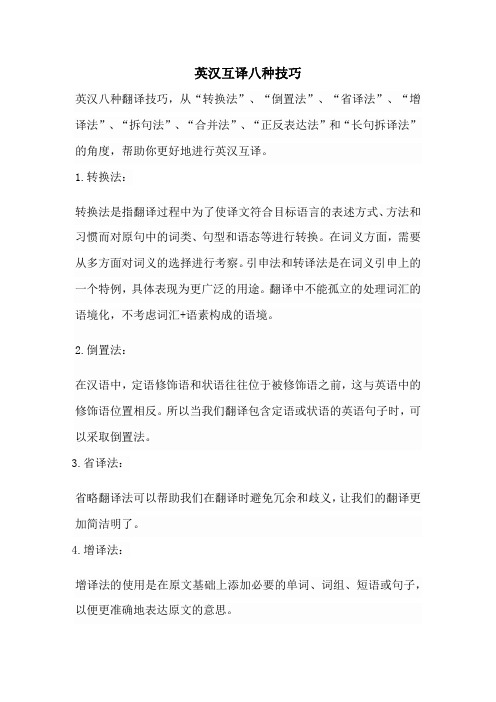
英汉互译八种技巧英汉八种翻译技巧,从“转换法”、“倒置法”、“省译法”、“增译法”、“拆句法”、“合并法”、“正反表达法”和“长句拆译法”的角度,帮助你更好地进行英汉互译。
1.转换法:转换法是指翻译过程中为了使译文符合目标语言的表述方式、方法和习惯而对原句中的词类、句型和语态等进行转换。
在词义方面,需要从多方面对词义的选择进行考察。
引申法和转译法是在词义引申上的一个特例,具体表现为更广泛的用途。
翻译中不能孤立的处理词汇的语境化,不考虑词汇+语素构成的语境。
2.倒置法:在汉语中,定语修饰语和状语往往位于被修饰语之前,这与英语中的修饰语位置相反。
所以当我们翻译包含定语或状语的英语句子时,可以采取倒置法。
3.省译法:省略翻译法可以帮助我们在翻译时避免冗余和歧义,让我们的翻译更加简洁明了。
4.增译法:增译法的使用是在原文基础上添加必要的单词、词组、短语或句子,以便更准确地表达原文的意思。
5.拆句法:当我们面对长而复杂的英语句子时,可以尝试使用拆句法。
这种方法可以帮助我们更好地理解和翻译每一个小句子,从而使整体翻译更加流畅。
6.合并法:与拆句法相反,合并法是将几个短句子合并成一个长句子。
这种翻译技巧通常用于处理英语中的复合句。
通过合并法,我们可以使译文更加紧凑、连贯。
7.正反表达法:有时,英语中的正说可以采用反译的方法,反之亦然。
这种方法可以帮助我们更好地适应不同语言的表达方式和习惯。
8.长句拆译法:对于长而复杂的英语句子,我们可以尝试将其拆分成几个小句子,以便更好地理解和翻译。
这种方法可以帮助我们理清句子的结构和层次,使整体翻译更加清晰明了。
汉译英翻译技巧及方法

What has happened since the outbreak of the
international financial crisis in 2008 shows that we are
facing not just an economic and financial crisis. It is a crisis that has exposed certain deficiencies in the existing institutions and mechanisms, policies and approaches, and ways of development. The world economy is now at a crossroads and global economic governance faces arduous tasks. It is imperative that we stand on a higher plane, transcend differences on specific issues, move beyond short-term considerations, and jointly seek ways to overcome the crisis and sustain development.
As the premier forum for international economic cooperation, the G20 must continue to demonstrate the spirit of standing together in times of adversity and pursuing win-win cooperation. At this critical moment, the G20 must work to address the key problems, boost
汉译英翻译技巧

汉译英翻译技巧汉译英是翻译中的一个重要方向,也是一个相对来说较难的环节。
以下是一些汉译英的技巧,帮助你更好地翻译。
1. 理解上下文:在汉译英时,需要首先理解句子或段落所在的上下文,包括文化背景、语义关系等。
这样可以准确地翻译出作者的意图和观点。
避免字面翻译,要根据上下文合理转化。
2. 保持简洁:英语中通常使用简洁的表达方式,因此在翻译过程中要尽量减少冗余和重复的词语。
同时,要注意避免使用过于复杂的词汇和句子结构,保持句子简短,易于理解。
3. 注意动词时态:在汉译英中,需要根据上下文和句子的时态来选择合适的动词时态。
如果句子描述的是过去的事件或状态,应使用过去时;如果描述的是现在的事件或状态,应使用现在时;如果描述的是将来的事件或状态,应使用将来时。
4. 分清主谓宾关系:中文中主谓宾的顺序与英文中可能不同,所以要准确理解句子的主谓宾关系,正确表达出来。
主语通常出现在句子的开头,而宾语往往出现在动词之后。
5. 注意使用连词:英语中使用连词来连接不同的句子部分,以表达它们之间的逻辑关系。
因此,在汉译英时,要注意使用适当的连词,如and、but、or、however等,以确保句子之间的逻辑连贯。
6. 熟悉常用短语和惯用语:英语中有很多常用短语和惯用语,熟悉这些短语和惯用语能够使翻译更加自然和准确。
可以通过阅读英文书籍、新闻和文章来积累常用短语和惯用语。
7. 注意名词的单复数:英语中名词的单复数形式有很多规则,要注意根据上下文正确地使用单数或复数形式。
例如,当描述一般事实或抽象概念时,通常使用单数形式;当描述可数的事物时,使用复数形式。
8. 使用正确的词汇和词组:在翻译中,要选择准确的词汇和词组来表达原文的意思。
可以使用工具如在线词典或翻译软件来查找合适的词汇和词组。
9. 避免直译:汉译英时,要避免直译,尽量用英语习惯表达相同的意思。
直译通常会产生句子结构不通顺,语义混乱的问题。
要根据英语的表达习惯和习惯用法,选择合适的翻译方式。
- 1、下载文档前请自行甄别文档内容的完整性,平台不提供额外的编辑、内容补充、找答案等附加服务。
- 2、"仅部分预览"的文档,不可在线预览部分如存在完整性等问题,可反馈申请退款(可完整预览的文档不适用该条件!)。
- 3、如文档侵犯您的权益,请联系客服反馈,我们会尽快为您处理(人工客服工作时间:9:00-18:30)。
二)句的翻译
• >> 6)无主句 汉语有很多无主句,这符合汉语意合的思维习惯。 而英语则多重形合,句子一般都需要主句。汉译 英时,就需要补出省略的主语,或改变句型结构。 【原文】:但是,大体上看一个人对生命的态度是 否严肃认真,看他对待工作、生活的态度如何, 也就不难对这个人的存在意义做出适当的估计了。 【译文】:However, if we,on the whole, can find out whether his attitude towards his life is serious or not and what is ….
二)句的翻译
• • • • • >> 3)正反转换 (1)汉语正说,英语反译 (2)汉语反说,英语反译 (3)汉语反说,英语正译 (4)双重否定的翻译
• >> 4) 语态对译。主动语态与被动语态的 转换。
二)句的翻译
• • • • • • >> 5)长句翻译 (1)原序对译 (2)分句合译 (3)断句分译 (4)主、次信息句 例文:很难说他什么时候回家,我得上床 睡觉了。 • 译文:There being no telling when he’ll be home, I have to go to bed now.接(cohesion),也称段落的粘合, 是指段落中各部分在语法和词汇方面的关 系,即段落的各个部分的排列和连接要符 合逻辑。
2)段落的连贯 段落的连贯(coherence)指的是内容情节的 串联,或者逻辑关系上的贯通,总得来说 就是有完整的语义关系。
三)段落翻译
汉译英翻译技巧
Sub Title here
一)词的翻译
• • • • • >>1.词义选择 (1)语境词 例子: 原句:手机刷新了人与人的关系。 译文:Cell phone have altered the relationship among people. • 分析:“刷新”此处实际是指“改变”, 而并非是我们平常所指的含义,因此不宜 译成refurbish或renovate,翻译为alter或 change更恰当。
二)句的翻译
• >> 2)语序调整
• (1)定语,状语与叙事中心的位置 • 原文:我在山坡的小屋里,悄悄掀起窗帘,窥见 园中大千世界,一片喧闹。 • 译文:Without being noticed, I lifted the curtain in my small room,only to spy the bustle of a kaleidoscopic world down in the garden.(状 语前置) • (2)强弱词语的不同,否定转移 • (3)习惯用法
参考译文:
• Marriage, family and children are very important in the Chinese culture. Because such a large portion of the population lived in rural environments for so long, getting married and having children meant that you'd have workers and be able to create and maintain a homestead. Traditional marriages were arranged by the parents of the bride and groom. Many couples never even met one another until their wedding day. Modern Chinese couples choose their own partners, but many still ask for their elders' approval. In the traditional Chinese family, the man is responsible for maintaining, providing for and protecting his family. Traditional Chinese mothers usually stay in the home to take care of the home, the children, and the rest of the family. Many modern Chinese women have careers, but still rely on their husbands or fathers for financial support at some point in their lives.
二)句的翻译
• • • • • • • >> 1)确立主干 (1)确定主语 例文:这个地方比较多雨。 译文1:It rains a lot in this area. 译文2:This area sees much rain. 译文3:There is much rain in this area. 分析:汉语主语的角度变化很少,而英语则变化 较多。例题原文的主语只能由“这个地区”担当, 但在译成英语时就有了多种选择。 • 同时还可以使用There be 结构和It 作主语。 • (2)确定谓语
一)词的翻译
• • • • • • >>2.词类转换 (1)动词名词 (2)动词介词 (3)动词形容词 (4)形容词或副词名词 (5)名词动词
一)词的翻译
• • • • >>3.词的增补 (1)语法需要 (2)意思表达需要 (3)文化背景解释的需要
• >>4.词的减省 • >>5.词的代替(用代词代替重复的部分)
一)词的翻译
• (2)表意模糊的词 例文:这所全国重点大学为社会输送了大 批的人才。 译文:The national key university has prepared batches of qualified graduates for the society. 分析:“输送”在句中是一个模糊笼统的 词,具体说来是指“培养出”。“人才” 笼统,译为qualified graduates比较确切。 • (3)比喻词汇 • “开小灶”----“give special tuition”
• 3)段落的文体 ◇◆ 散文的文体 散文翻译是一门艺术性劳动,难度很 大。散文通常是作者自己的独白,靠 真情和文采打动读者,因此散文的翻 译要看译文是否传达了原作的感情。 译文要求完整流畅,符合英语表达 习惯,前后呼应,浑然一体。
• 中国文化非常看重婚姻,家庭和孩子。大部分中 国人口在农村长期居住,娶妻生子意味着你将拥 有帮手,能够创造和保持一份家产。传统的婚姻 是由新郎和新娘的父母安排的。许多夫妻他们直 达结婚那天才见到自己的另一半。现代中国的夫 妻都是自己选择结婚对象,但很多还会寻求父母 的赞同后才再结婚的。传统中国家庭中,男人要 承担其养家糊口,保护家人的责任。女人们一般 呆在家里,相夫教子,打理家务,照顾家人。现 代中国女人一般都有自己的职业,但仍在生活中 的某些方面依赖着丈夫或父亲提供的经济支持。
